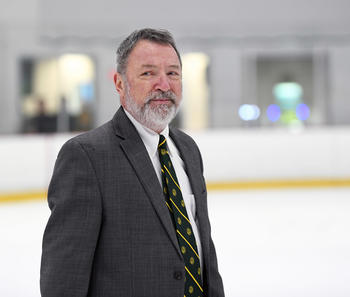Andrew Nash, BS in Sports Management ’17, MS in Sports Management ’18, has played a lot of sports in his lifetime. Nothing, he says, is like hockey.

“Maybe it’s the travel, or the difficulty of the sport, but it really bonds you together like no other sport I’ve played,” Nash said. “The sense of community is stronger than I ever felt.”
Community is the foundation of the George Mason University Ice Hockey Club, a philosophy that extends beyond the barriers of the rink and past the stadium’s aluminum bleachers. In partnership with the Washington Capitals and Prince William County, George Mason Ice Hockey is working to expand access to hockey through an outdoor ball hockey rink right next to their home ice in Prince William Ice Center.
While a fantastic sport, ice hockey can be inaccessible. Players need access to an ice rink and need to be able to skate adeptly; they need full-body padding and a means to transport and care for that equipment; they need to be able to pay club fees, rink fees, and travel fees.
However, ball hockey—also called street hockey—opens the door to opportunity. Players only need sneakers, a stick, and a ball, and you’re ready to play.
“Ball hockey is a fantastic way to expand access to ice hockey,” said Steve Hyjek, former head coach of the George Mason Hockey Club. “It gives more people the opportunity to try the sport, to love the sport, and to become future players or fans.”
Hyjek, who retired from his role as head coach this year at the team’s 2024 charity game, wanted his players to be active and engaged citizens, giving back to their communities long after their time at George Mason has ended.
The annual charity game is one component of that. Prior to the game, for example, players meet with the people for whom they’re fundraising. “I want them to understand who they’re helping, and why we’re helping them,” Hyjek said. “It makes them feel more connected to the cause, and to the community that supports them, but it also makes this act of giving back almost like a muscle memory. So when they graduate, they keep doing it.”
This philosophy is one that has shaped his players’ careers.
During his junior year, Nash got an internship at the Washington Capitals thanks to Hyjek and the other coaches’ connections. Nash has worked for the Capitals ever since, now as the manager for youth hockey development. His job is expanding accessibility of hockey to the Washington, D.C., Virginia, and Maryland community, through off-ice clinics in the form of ball and inline hockey.
“There will always be people who can’t afford to play ice hockey, or for whom an ice rink is too far from them to make regular games and practices feasible, but we don’t want to push them aside and say, ‘you can’t afford it, you’re not close to a rink, so you don’t matter,’ ” Nash said. “The hope with these workshops is that we show kids and families that there are alternatives, and further develop a community for the Capitals through increased interest in the sport.
“Without the community,’ Nash said, “there is no team.”

Mae Whitesides, BA Criminology, Law and Society ’19, managed the team’s social media and website during her time at George Mason. Like Nash, her time in George Mason hockey opened the doors for a career in sports with the Washington Capitals marketing department and, more recently, social media for MLB Network and NHL Network. The dedication to supporting each other and the community was, she said, one of her fondest memories from her time at George Mason.
“The charity game my senior year was standing room only,” she said. “We would not be who we are today if not for that support from the community, and the work people like Steve put into building up our team.”
Hyjek agreed. “When you expand the community of folks who are playing the game or who are interested in the game, it helps the sport. For us, we hope that our work brings more players interested in George Mason and Mason Hockey, or even just more fans.”
This hypothesis has already proven to be true: After spending the day at a local elementary school, teaching kids how to play ball hockey, he’s seen some of those students in the stands of their games, as well as at Learn to Skate clinics. With the new ball hockey rink, he hopes that interest will continue to grow, not just in hockey but in George Mason as well.
“You’re planting seeds,” Hyjek said. “Planting seeds so that George Mason can be on their list when the time comes.”
Related News
- December 16, 2025
- December 11, 2025
- December 8, 2025
- November 7, 2025
- September 26, 2025
